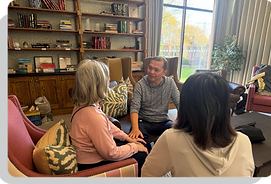
Brain Rover
As the global population ages rapidly, the prevalence of dementia continues to rise, making it a critical public health issue. Brain Rover, established in 2023, operates as a mobile service across various locations in the UK. We offer diverse Cantonese-based services to raise public awareness about brain health, supporting People Living With Dementia (PLWD) and their families. Together, we aim to address the challenges of dementia and help create a better quality of life for the PLWD community.

Scope of Services
Brain Info
We promote brain health and dementia awareness through public lectures, information booths, and media platforms to enhance understanding across the community.
Brain Aware
We provide a simple checklist to help you better understand your cognitive health.
Brain Groups
We organise and implement Cantonese-based support groups, workshops, home visits, and online services to assist PLWD and their carers, individuals with early cognitive impairments, and those concerned about brain health.

Brain Work
Adopting a strength-based approach, we identify and promote the abilities of PLWD, enabling them to participate and contribute in various areas.
Cognitive Ignitor
We mobilise community members to participate in volunteer work focused on brain health and train “Cognitive Ignitors” to promote brain-stimulating activities for the elderly, working together to build a dementia-friendly community
The Five Elements of Brain Rover
All of the programmes are structured by these five essential elements to facilitate Brain Health:
Cognitive Stimulation Activity



Psychological Health

Physical Exercise

Nutrition Information



Social Interaction
Let You Know More About Our Services

Talks and Workshops
We organise talks and workshops to raise public awareness of brain health, deepen understanding of dementia, and promote early prevention.

HomeConnect
We also run a weekly group activity that combines physical exercise, brain-stimulating activities, and social interaction. It helps PLWD build social connections and establish healthy routines for physical and cognitive well-being, while also offering practical caregiving skills and peer support for carers.

Online Cognitive Stimulation Programme
To accommodate geographical or scheduling limitations, we offer one-to-one brain stimulation sessions via online video calls. Through these regular virtual sessions, participants living with dementia or cognitive conditions can connect with trained volunteers—our “Brain Boosters”—to engage in guided physical and cognitive activities from home.

Home Visits
We visit people living with dementia and their carers at home to provide personalised support and compassionate care tailored to their needs.

Carer Support
By building a support network, we facilitate carers to connect with one another, share experiences, and access relevant resources—empowering them to better navigate the challenges of the caregiving journey.
Our and Their Stories
HomeConnect
Our family events bring together physical exercise, brain-stimulating activities, and social connection. These gatherings help PLWD stay active, build social networks, and develop healthy routines, while offering carers emotional support and practical caregiving strategies.
Advance Care Planning
At one of our HomeConnect meetings, guest speaker Ms. Sun Hei-ping shared valuable insights on Advance Care Planning (ACP) and Advance Directives (AD). These discussions encouraged PLWD to express their personal wishes and opened space for meaningful family conversations.

Home Visits & Online Support
We provide home visits and virtual meetings to support PLWD and their carers in adapting to life in the UK. These sessions cover practical topics such as safety, hygiene, communication skills, and daily routines.

Mid-Autumn Memories
PLWD and carers celebrated Mid-Autumn Festival with Lantern Riddles and traditional phrases, sparking nostalgic memories and meaningful interactions.


Independent Cooking Activity
In a hands-on cooking session, PLWD made 'Ma Lai Go' (a traditional Chinese steamed sponge cake) independently, boosting their confidence and giving them a sense of accomplishment.

Respite for Carers
Through planned group activities, carers received much-needed breaks while PLWD enjoyed a safe, engaging environment—allowing both parties rest and recharge.
Video Interview
What are the signs that may indicate your loved one is experiencing dementia? What should we do if elderly immigrants in the UK are suffering from dementia? What challenges do people living with dementia and their carers face in the UK?
In this episode of BeanTalk, we share our experience walking with People Living With Dementia and their families in their daily care and the challenge they met.